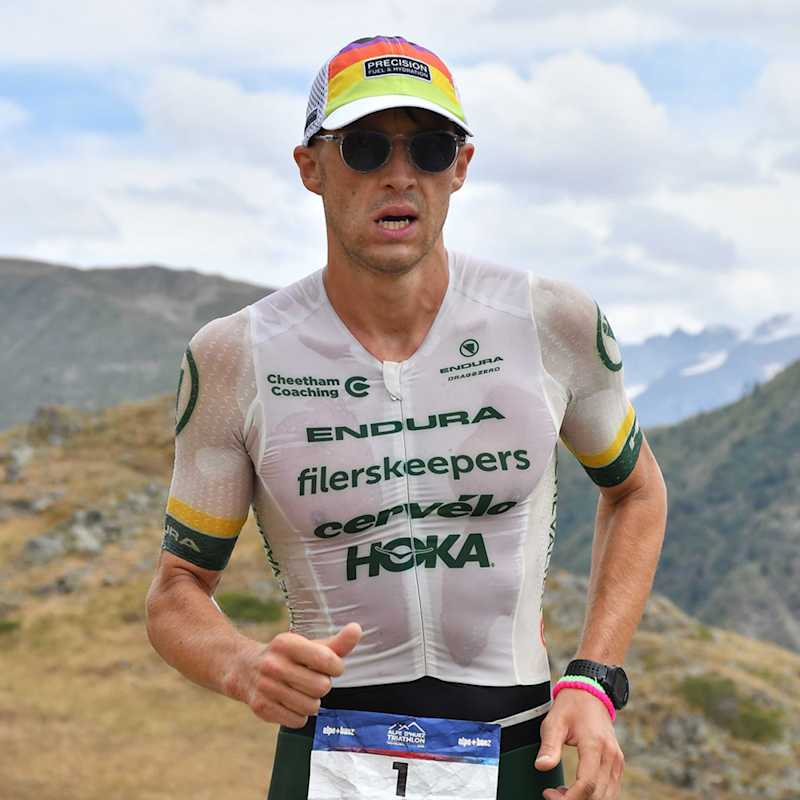
Leon Chevalier
T100 London
Leon's headline numbers
Leon's strategy
Fueling
Carbohydrate is the main fuel you burn when racing. Failing to fuel properly is a leading cause of underperformance in longer races.
Leon has always tolerated high amounts of carbohydrate during middle and full-distance triathlons, without suffering from any GI distress. In London he took his highest intake yet, adding to the anecdotal evidence that athletes can tolerate >90g per hour, and once again he experienced no GI discomfort. This will always benefit him by providing ample energy to sustain his performance, but increasing his carb intake beyond this will offer diminished returns. This is because it’s unlikely Leon’s gut can actually absorb this much, even if he can tolerate it, and as no scientific papers currently demonstrate absorption rates anywhere close to 144g per hour, continuing to increase his intake will only increase the risk of unabsorbed carbs remaining in his gut, and causing gastric upset.
Hydration
Taking on board an appropriate amount of fluid and sodium is essential to maintaining blood volume and supporting the cardiovascular effort needed to perform on race day.
Whilst the absolute amount of sodium and fluid consumed per hour is important, it’s critical to consider these in relation to each other. This is known as 'relative sodium concentration' and it’s expressed in milligrams per litre (mg/L). How much sodium you’re taking in per litre of fluid is more important than the absolute amount taken in per hour.
Sweat sodium concentration (mg/L) is largely genetically determined and remains relatively stable. Knowing how salty your sweat is enables you to replace a good proportion of your sweat losses, which can range from 200-2,000mg/L.
Given Leon’s losses are High (1,392mg/L), nailing his hydration strategy becomes especially crucial when it’s hot and/or humid.
Learn moreLeon’s usual strategy for hydration is to load his 1L bike bottles with both his fuel and hydration. He also chooses to be self-sufficient with his electrolytes, so slightly over-concentrates his bottles using PH 1500 (Drink Mix). As a result of both these factors, and the suboptimal water quality in the swim, he recalled having a particularly dry mouth on the bike, so opted to pick up plenty of plain water from the on-course aid stations during the second half. This subsequently reduced the relative sodium concentration of his drinks, but alleviated his thirst sensations so he did well to react to his senses, and replace his fluid losses.
Caffeine
Beyond the Three Levers of Performance (carb, sodium and fluid), caffeine is one of only a few substances that is proven to improve performance for most endurance athletes as it can help stave off mental and physical fatigue.
Leon is used to drinking coffee frequently, and has practised taking PF 30 Caffeine Gels for a long time in training so he feels that his tolerance is quite high. By circulating some caffeine in his bloodstream throughout the morning with a few cups of coffee, and topping up with PF 30 Caffeine Gels during the race, he reached the top end of the scientific guidelines which would have reduced his perception of effort throughout.
How Leon hit his numbers
Here's everything that Leon ate and drank on the day...
Leon's weapons of choice
Final thoughts
Leon's full stats
Data Confidence?
There is an adequate level of accuracy in the data collected and the numbers reported. The athlete manages to recall what they ate and drank including most specifics (brands flavours quantities plausible estimations of volumes). However there are estimations made within the data which affect the overall confidence level in the data reported.